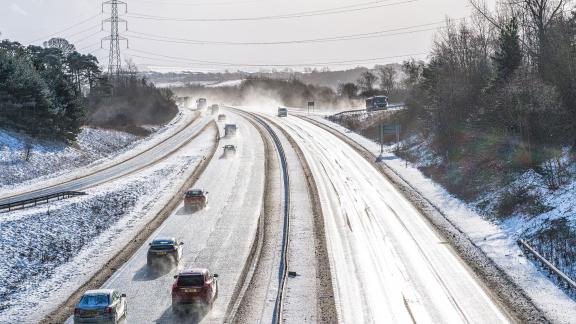What does OD have to do with the climate and ecological emergency?
12 February 2021
Authors
-

Abigail Hopewell, head of leadership and OD at Gloucestershire Hospitals NHS Foundation Trust, shares the stark reality of why we are living in a climate and ecological emergency, and how harnessing the expertise of OD professionals can help the NHS build a greener future.
COVID origins
The pandemic has turned our work, lifestyles, livelihoods, and priorities upside down. The significant toll on our collective physical, mental and economic health is staggering.
As I look back over the last year on the impact of the pandemic, I can’t help but reflect on how human behaviour may have increased its likelihood. COVID-19 is a zoonotic disease, whereby germs have passed from animals to humans.
Such transmissions are occurring with increasing frequency as humans disturb natural habitats and destroy biodiversity to harvest resources (water, fossil fuels, timber, food, farming land, ore) which ultimately feed our collective appetite for more ‘stuff’.
Climate and ecological emergencyWe’re all aware of the growing climate and ecological emergency including:
-
ever-increasing greenhouse gas emissions (the UN reports that the COVID-19 lockdowns – lauded for helping reduce global carbon emissions by 7 per cent in 2020 - are predicted to only lower temperatures in 2050 by a negligible 0.01C)
-
relentless fossil fuel extraction (we produced around 100 million barrels of oil a day in 2019)
-
countless heart-wrenching tales highlighting the painful destruction of our natural environment.
In the face of such data, we may feel shocked, sad, horrified, powerless, and even full of grief. Or maybe we become desensitised, cynical, or go into denial. I have certainly experienced all these emotional states.
The climate footprint of the NHS
When it comes to our own backyard, the NHS is a major contributor of carbon emissions. Globally, the healthcare industry’s climate footprint accounts for 4.4 per cent of CO2 emissions.
The NHS produces higher than average emissions – 5.4 per cent of the UK’s total carbon emissions. This is only just slightly less than the aviation industry and the agriculture, forestry and land use industry (6.5 per cent each, according to the Committee on Climate Change).
The sad irony is that while NHS colleagues are working tirelessly to protect, care for and improve human health today, our sector’s carbon emissions are contributing to worsening health outcomes for everyone tomorrow.
In the UK, this has been recognised by NHS England and NHS Improvement, which has established a Greener NHS campaign, with the intention for the NHS to produce Net Zero carbon emissions by 2040.The hard truths
As planet Earth continues to warm, this will lead to higher temperatures, rising sea levels, more floods and droughts, shortages of food and water supplies, poorer nutritional value of available food sources, and even greater levels of CO2 in the atmosphere (including toxic particles caused by increased wildfires).
Consequently, around the world we can expect to see more incidents of heat-related disease, vector and waterborne disease, respiratory and cardiovascular disease, nutritional disease, poorer outcomes for babies and children, and more people experiencing trauma and mental health disorders.
Existing populations living with underlying health conditions and vulnerabilities, and those subject to systemic and socio-economic disadvantages, are likely to fare worse. People in developing countries, which have contributed least to the climate emergency overall, will also bear the brunt as they have less resilient infrastructure and resources to mitigate and adapt effectively.Greener NHS
What does this all have to do with the NHS Do OD community? I think it has everything to do with us.
The climate and ecological emergency is vast and complex; it is happening before our eyes in an uneven, unpredictable fashion; and it has multiple considerations and implications for individuals, organisations and systems. It is time for us all to respond with the same level of focus, determination and urgency as has been demonstrated by our colleagues in response to the COVID-19 pandemic.
At Gloucestershire Hospitals we declared a climate emergency in December 2019. Despite COVID-19 delaying our subsequent progress in the spring, we have established a climate emergency response group to oversee our activities.
We are due to launch a new ‘Green Champions’ network in early 2021 to drive engagement and involvement of our colleagues on green matters. We have also started collaborating with our ICS system partners to support one another and face the challenges together.What OD practitioners can do
At Do OD, we say that our profession enables people to transform systems: ‘OD is the application of behavioural science to organisational and system issues to align strategy and capability. It enhances the effectiveness of systems through interventions that enhance people’s collective capability to achieve shared goals.’
For me, there is no other shared goal more important or urgent for us to lend our expertise and skills.
Working in partnership with our sustainability colleagues, OD professionals have a critical role to play in enabling our leaders and teams across the health and social care system to mitigate our impact on the environment, navigate and adapt to the climate and ecological challenges we are likely to face, and protect both planetary and human health.
So what could you do? One suggestion is to start with wherever you are – your own organisation. Here are some suggestions:-
Connect with colleagues already working on sustainability. Explore with them how you can ‘do OD’ in support of their work.
-
Identify the executive lead for sustainability and have a conversation with them.
-
Host a Big Green Conversation – invite everyone and see who signs up. There may be more than you think! Generate conversation, formulate ideas, identify next steps, take action, build momentum.
-
If you’re already involved in your organisation’s sustainability activities, that’s great – keep going. Consider whose voices in your organisation may be missing and can help to enrich the work you’re already doing…how could you reach out and engage with them?
-
